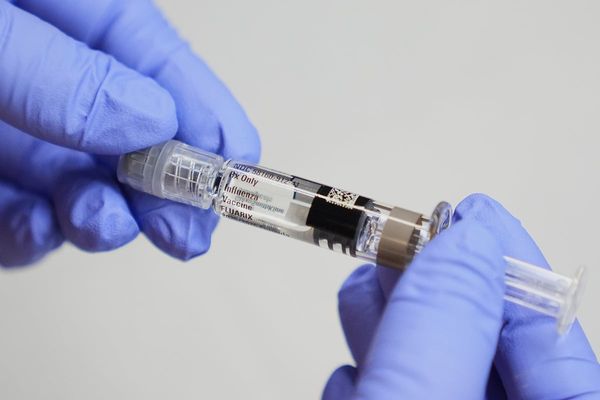Taiwan's presidential candidates are now set for the Jan. 13 showdown that could turn out to be the most status-quo-altering election in 2024 for the world and the S&P 500.
The outcome of Taiwan's election will likely determine Beijing's next move. Expect a diplomatic bear hug if a candidate favoring closer ties with China wins, or something more hostile if the pro-independence Democratic Progressive Party retains power. Odds of a DPP win improved on Friday as two opposition parties registered for the election after a deal to form a unity ticket fell apart. No matter the outcome, President Biden's geopolitical gambit to preserve America's technology and military advantage is entering a period of maximum risk.
U.S.-China Chip War Centers On Taiwan
If there's one thing that the U.S. and China agree on, it's that advanced chips are the most critical strategic asset. America pioneered the semiconductor industry and won the Cold War largely because of it. Yet, by an accident of economic history and Morris Chang's visionary leadership of Taiwan Semiconductor Manufacturing, the U.S. stores its crown jewels, so to speak, 100 miles off the coast of the Chinese mainland.
Now the U.S. has assembled a united front to deprive China of the world's most advanced chips and equipment to make them. Those cutting-edge technologies come from the U.S., U.K., the Netherlands, South Korea and Japan. Yet 90% of advanced chips designed by companies like Nvidia, Apple and Broadcom, are made at the sprawling TSMC factory campus on the island that China claims as its own.
That's why Beijing views the U.S.-China chip war not just as injurious — since it has an explicit goal of diminishing China's technological capability — but as a direct challenge to its sovereignty.
"Both Washington and Beijing are fixated on controlling the future of computing," Chris Miller writes in the 2022 book "Chip War: The Fight for the World's Most Critical Technology." "To a frightening degree, that future is dependent on a small island that Beijing considers a renegade province and America has committed to defend by force."
Yet a key question is just how determined the Biden administration is to keep advanced semiconductor technology out of China's hands. The Aug. 30 unveiling of a 5G smartphone by Chinese tech powerhouse Huawei, later confirmed to have a highly advanced chip, signaled that U.S. efforts to contain China's technology ambitions are failing. While the Biden administration responded by adopting still-tighter export restrictions for AI chips and advanced semiconductor-making equipment in October, those updated rules already appear to be falling short.
Biden-Xi Meeting
President Biden and Chinese President Xi Jinping met outside San Francisco earlier this month, a hopeful sign after the U.S.-China relationship had grown from bad to worse since the unveiling of broad export controls in September 2022.
Both sides have good reason to try and halt the downward slide in U.S.-China relations. Biden, facing a reelection battle, already has his hands full with military conflict in Ukraine and the Middle East. As China's economy suffers a prolonged hangover from its property bubble, foreign investment has dried up.
While Xi reportedly affirmed China's stance that unification with Taiwan is unstoppable, U.S. sources said he also indicated that there are no plans for an invasion.
That assurance doesn't count for much, but the presidential and vice-presidential candidate from Taiwan's incumbent party, the Democratic Progressive Party, or DPP, have seized on that report to downplay the threat of an invasion. Now China has begun to push back, saying DPP talking points misconstrue the Biden-Xi exchange. Taiwan's relationship with China is the biggest issue in the presidential election, and the threat of an invasion is the biggest reason why the Taiwanese could choose an opposition candidate.
Chinese military activity in the Taiwan Straits may increase in coming weeks to drive home the risk Taiwan faces.
The stakes couldn't be higher. A conflict over Taiwan would have a profound impact on what Biden has characterized as the wider "battle between democracy and autocracy." The one certainty: An invasion or blockade of Taiwan could sink the global economy into chaos.
Taiwan Semiconductor's 'Silicon Shield'
A Chinese blockade of Taiwan — even one that doesn't spiral into a military conflict — could disrupt over $2 trillion in economic activity by severing the primary source of advanced semiconductors from global supply chains, Rhodium Group estimates. Taiwan Semiconductor's output — including 70% of all smartphone chipsets, 30% of auto microcontrollers and a dominant share of chips for high-end graphics processing units for PCs and servers — feeds through to $1.6 trillion in annual corporate revenue for its global customers, the research firm says.
China's own economy would suffer mightily. Beijing's Made In China 2025 strategic plan set a decadelong goal for domestic output to supply 70% of the chips used by its tech, auto and electronics industries. But Chinese firms only supplied about 7% of its $187 billion chip market in 2021, IC Insights says. Even including domestic semiconductor plants operated by foreign firms such as TSMC, Intel and Samsung, China sourced only 17% of its chip needs from within.
The reliance on Taiwan's chip production has served as a "silicon shield," keeping China's territorial ambitions at bay.
Even in the unlikely event that Beijing quickly prevailed and seized TSMC intact, there would be no escaping massive economic fallout for China and the world. The U.S. would presumably bar companies like Applied Materials, KLA Corp. and Lam Research from providing support and components for their equipment. In short order, the world's most exacting manufacturing processes would grind to a halt.
Put simply, "Even if the other side owns TSMC, this golden hen will not be able to lay a golden egg," National Security Bureau Director-General Chen Ming-tong told Taiwanese lawmakers last October.
Top Semiconductor Industry Foundries
| Company | Country | Q2 revenue, in billions | Market share |
|---|---|---|---|
| Taiwan Semiconductor | Taiwan | $15.66 | 56.4% |
| Samsung | S. Korea | $3.23 | 11.7% |
| GlobalFoundries | U.S. | $1.85 | 6.7% |
| UMC | Taiwan | $1.83 | 6.6% |
| SMIC | China | $1.56 | 5.6% |
| Hua Hong Group | China | $0.85 | 3.0% |
| Tower | Israel | $0.36 | 1.3% |
| PSMC | Taiwan | $0.33 | 1.2% |
| VIS | Taiwan | $0.32 | 1.2% |
| Nexchip | China | $0.27 | 1.0% |
| Top 10 total | $26.25 | 95% |
Upcoming Taiwan Election
China's only real hope for reclaiming Taiwan while retaining the island's chipmaking prowess comes at the ballot box. If the Taiwanese people elect a president seeking more amicable ties with Beijing, it might become harder for TSMC to follow U.S. marching orders in its chip war vs. China.
"You don't invade Taiwan because you want technology," BCA Research chief geopolitical strategist Matt Gertken told clients on an August webcast. The way for China to gain access to TSMC's advanced fabs is to "have enough political influence so they do not enforce American export controls."
Just what might change if a China-friendly candidate comes to power is far from clear. Chinese technology giant Huawei was one of TSMC's biggest customers until 2019, when sanctions by the Trump administration cut off its access.
Odds that current Taiwan vice president and DPP presidential candidate William Lai will prevail improved in recent days as negotiations fell apart for a joint ticket between the Kuomintang (KMT) and Taiwan People's Party (TPP).
Recent polling has shown the DPP and KMT candidates both with 31% and the TPP candidate with 25%.
Foxconn founder Terry Gou threw his hat in the ring in August, promising to "bring 50 years of peace to the Taiwan Strait."
Gou, who warned that Taiwan could become "the next Ukraine," announced Friday that he's dropping out of the race. He would likely have diverted votes from the KMT. BCA's Gertken noted that a Chinese investigation of Foxconn may have been designed to pressure him to exit the race. Gou, who resigned in 2019 as chairman of the manufacturing giant that produces the Apple iPhone, had made a failed bid to secure the KMT nomination this summer.
If the DPP prevails, "Xi might conclude that coercion has failed and consider more violent options," Johns Hopkins University professor Hal Brands wrote in Foreign Policy.
U.S.-China Trade War Over Technology Heats Up
China's 'Faster Timeline' To Invade Taiwan
In recent years, U.S. military and intelligence analyses concluded that Xi was pushing his military to be ready to seize Taiwan by 2027. But Secretary of State Anthony Blinken and others have begun warning that China is pursuing reunification on a "much faster timeline."
"My gut tells me we will fight in 2025," Air Force Gen. Mike Minihan wrote in a January memo obtained by the press. In October 2022, Admiral Michael Gilday, then chief of naval operations, even spoke of a potential "2023 window" for an invasion.
Beijing may conclude that the sooner it acts, the better its chances of success. For one thing, support for Ukraine as it tries to repel Russian occupiers has stretched U.S. military readiness.
A June report from a Council of Foreign Relations task force on defending Taiwan acknowledged the Ukraine war's strategic importance. But the task force warned that the U.S. "will need to urgently repair its defense industrial base" to prepare for a high-intensity war with China.
Pentagon Scales Up To Deter China
The Pentagon has since doubled production to 28,000 artillery shells per month, but that's still less than Ukraine now uses. Its new goal is to reach 100,000 rounds per month by 2025.
The U.S.-China chip war also likely increases Beijing's sense of urgency to seize Taiwan, shifting its priorities toward military action over economic concerns.
"American measures to cut off China from TSMC's advanced logic-chip manufacturing capabilities reduce the costs to China of any disruption to TSMC caused by war, thereby decreasing the deterrent effect of the 'silicon shield,'" wrote China Heritage research fellow Sam Chetwin George.
The longer that China loses access to the most advanced technology, the greater the chances that U.S. military capabilities neutralize or eclipse Beijing's strengths.
That prospect may have been brought home in August when the Pentagon unveiled its Replicator program. Over 18 to 24 months, the program will deploy thousands of AI-powered autonomous combat drones able to swarm enemy forces.
Deputy Defense Secretary Kathleen Hicks made no secret about Replicator's chief mission — to "overcome the PRC's (People's Republic of China's) biggest advantage, which is mass: more ships, more missiles, more people."
"Now is the time to scale, with systems that are harder to plan for, harder to hit, and harder to beat than those of potential competitors," Hicks said.
Join IBD experts as they analyze leading stocks and the market on IBD Live
U.S.-China Chip War Turning Point
Autonomous combat drones are the kind of weaponry that National Security Advisor Jake Sullivan had in mind when he announced an escalation of the U.S.-China chip war in September 2022.
Previously, U.S. export controls had aimed to stay "only a couple of generations ahead" of geopolitical rivals. They didn't strive for dominance.
"That is not the strategic environment we are in today," he said, with Beijing willing to devote nearly limitless resources to achieving leadership in technologies that can act as "force multipliers."
The new goal, Sullivan said, must be to "maintain as large of a lead as possible."
A few weeks later, the U.S. announced sweeping export controls aimed at blocking China's chip progress at every choke point.
The rules didn't just establish a presumption of denial for Chinese purchases of the most advanced AI chips. They also aimed to deny China the software to design those chips and the equipment to produce them.
The export rules set the floor for chip-equipment exports above the 14-nanometer production achieved by China's largest chipmaker, SMIC, as early as 2019. By comparison, Taiwan Semiconductor celebrated the start of mass production using its 3-nanometer technology earlier this year.
As the industry strives to make ever-smaller circuits, which translate to faster and more power-efficient semiconductors, China risks being left further and further behind.
U.S. Export Controls Fail, In Blow To Apple
Yet nearly a year after the U.S. announced the sweeping restrictions and subsequently got key allies to comply, China delivered a wake-up call. Huawei's 5G Mate 60 Pro smartphone, powered by a 7-nanometer chip produced by SMIC, makes it "abundantly clear that the U.S. export controls are failing," wrote Dylan Patel of the SemiAnalysis research and consulting firm on Sept. 12.
U.S. and foreign chip-equipment firms sell gear to SMIC ostensibly meant for 28-nm production that can actually facilitate 7-nm chips, Patel says.
If nothing changes, he's convinced that Huawei and SMIC are on a path to manufacture 5-nm chips by 2025 or 2026 and attain large-scale AI chip production soon after.
Apple was a prime beneficiary of the Trump administration's export ban on Huawei, gaining tens of millions of iPhone sales and $20 billion in annual revenue, Patel says. Now Huawei may be in a position to win back those sales.
"The U.S. government and its allies could stop the Chinese semiconductor industry in its tracks," Patel wrote. But doing so will require turning what are essentially "half measures" into the equivalent of a "full-scale assault."
New Export Rules Target Nvidia
However, the Biden administration's tightening of export restrictions last month appear to fall short.
"We thought the U.S. locked down every single loophole conceivable" for selling AI chips to Chinese customers, Patel wrote on Nov. 9. "To our surprise, Nvidia still found a way."
Meanwhile, indispensable chip-equipment firms have noted on recent earnings calls that high-volume sales to China will continue.
ASML, which got 46% of revenue from China in the latest quarter, said updated export controls will only limit about 10% to 15% of shipments.
Chipmakers and equipment producers had lobbied to water down the export control rules to avoid killing off a major customer. Some in the industry argue that sales to China finance R&D that keeps U.S. and allied semiconductor industry players at the pinnacle. The counterpoint is that China may not be a customer for long. Patel reeled off six Chinese companies "that will soon be able to deliver on chips that are on par with Nvidia's A100."
Five Best Chinese Stocks To Watch Now
China's Choice: Economy Or Taiwan
If U.S. export controls continue to falter, Beijing may feel less urgency to invade Taiwan at a massive economic cost.
China already faces an economic reckoning and subdued growth for its long overreliance on property development and infrastructure projects. But economic concerns may not be the deciding factor.
"If China is sinking into lost decades and a debt-deflation trap and yet at the same time the Americans are actively trying to contain their economy," Gertken said, then Xi "could react very aggressively."
Xi has long said that uniting with Taiwan is essential to China's rejuvenation. However, starting last October he began discussing it less as a distant hope than as a promise. "Reunification definitely must be achieved and reunification definitely will be achieved."
Only the battle for global technology leadership, to make China's economy and military unsinkable, matters as much to Xi. The two goals are very much intertwined.
Beijing's Military Technology
China is working on its own combat drone swarms. The rapid growth of China's satellite program and jamming capabilities could interfere with U.S. targeting efforts, a Defense Intelligence Agency report warned last year. China also is acknowledged to have a lead in hypersonic weapons able to evade missile defenses.
How a Taiwan conflict would play out is uncertain, but China has clear geographical advantages. Just two U.S. air bases are close enough that fighter jets don't have to refuel and those are "highly vulnerable to Chinese missile attacks," the Council on Foreign Relations says.
A key question is who would join Taiwan in the fight. Official U.S. policy doesn't support Taiwan's independence. But Washington is supplying arms and Biden has pledged to come to Taiwan's defense if attacked. Other allies have stopped short of such a commitment but are working to deter China.
The U.S., Japan and South Korea signed a defense pact in August, expanding joint training exercises and establishing a crisis hotline. Around the same time, the U.S., Australia, Japan and the Philippines carried out military drills together in the South China Sea.
Taiwan Semiconductor Comes To Arizona
One thing is clear: The era of the U.S. putting all of its most-prized chips on Taiwan can't end fast enough.
Back in 1987, when Morris Chang started TSMC with funding from the government of Taiwan, the U.S. semiconductor industry manufacturing share was more than triple the current 12%. At the time, as Miller recounts in "Chip War," "fabless" semiconductor companies that designed and sold chips but contracted out manufacturing weren't much of a thing. But Chang believed innovation would flourish if startups could outsource chipmaking to a foundry.
So he built it, and they came in droves — Nvidia, Marvell Technology, Broadcom, Qualcomm, and eventually Apple, which began designing its own iPhone chips in 2009. And TSMC capitalized on its booming business to relentlessly improve its manufacturing processes, entrenching its advantage.
Now, partly spurred on by the $52 billion Chips and Science Act, Taiwan Semiconductor has broken ground on the first of two Arizona chip fabs. Initially, high-volume production was set to begin in 2024. But bringing TSMC's advanced manufacturing to the U.S. is proving exceedingly difficult. In July, the company pushed the ramp to 2025, citing a shortage of skilled workers.
Meanwhile, TSMC's ramp is going more smoothly, which is also providing big subsidies to try and regain some of its former chipmaking status. Its first Japanese plant is on track for production late next year and TSMC is weighing a third factory there.







